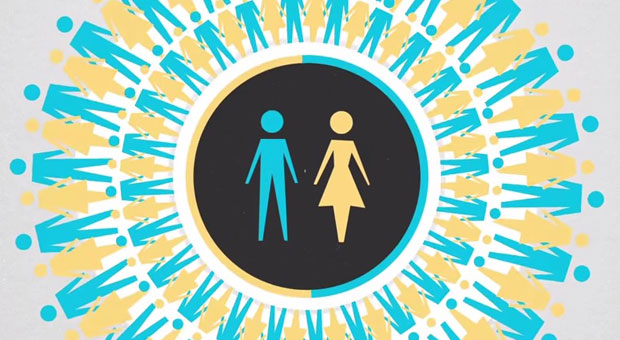Global Gender Gap: four lessons from this year's report
Britain drops down the international equality league as Rwanda breaks into the top ten

A free daily email with the biggest news stories of the day – and the best features from TheWeek.com
You are now subscribed
Your newsletter sign-up was successful
Research conducted by the World Economic Forum has revealed the global changes in equality between men and women.
The Global Gender Gap report analyses female participation in four key categories: the economy, education, health and politics.
"Only those economies who have full access to all their talent will remain competitive and will prosper," said Klaus Schwab, founder and executive chairman of the forum."But even more important, gender equality is a matter of justice."
The Week
Escape your echo chamber. Get the facts behind the news, plus analysis from multiple perspectives.

Sign up for The Week's Free Newsletters
From our morning news briefing to a weekly Good News Newsletter, get the best of The Week delivered directly to your inbox.
From our morning news briefing to a weekly Good News Newsletter, get the best of The Week delivered directly to your inbox.
Here are the key lessons from this year's report:
The gap is narrowing – but very slowly.
Overall, the majority of countries are showing signs of improvement, but progress is slow. Researchers predict that if current trends continue, total equality will not be achieved until 2095.
Nordic countries continue to lead the way
A free daily email with the biggest news stories of the day – and the best features from TheWeek.com
Iceland, Finland, Norway, Sweden and Denmark continue to occupy the top five positions. While no country has yet fully closed the gender gap – Nordic countries are more than 80 per cent of the way there. The governments in these countries excel at distributing resources and opportunities equally between both men and women.
Rwanda enters the ranking
The central African country enters the rankings in 7th position, as the highest-rated developing country in the world. In a nation where more than 44 per cent of the population live in poverty, it has managed to achieve a greater level of equality than the UK, the US or Germany. Women are almost equal members of the economy and the labour force and hold the majority of seats in its 100-seat parliament – the highest proportion in the world.
The UK drops to 26th place
This year, the UK has slipped eight places to 26th position, its lowest placing since the first report was published in 2008.
Overall, the UK has been given an equality rating of 73 per cent, with its lowest score coming in the political empowerment category. Less than a third of people in parliament are women and only 19 per cent of all ministerial positions are held by women.
In terms of wages, women are paid only 69 per cent of what men in identical positions receive. The recession can be blamed for the widening of the gender pay gap in the UK, according to the BBC.
"The issue in the UK is that while there are more women in the workplace they tend to be in the lower-level positions," Ann Francke, the chief executive of the trade body the Chartered Management Institute told The Guardian. "The pay gaps continue to be alarmingly large for men and women doing the same senior role."
-
 Local elections 2026: where are they and who is expected to win?
Local elections 2026: where are they and who is expected to win?The Explainer Labour is braced for heavy losses and U-turn on postponing some council elections hasn’t helped the party’s prospects
-
 6 of the world’s most accessible destinations
6 of the world’s most accessible destinationsThe Week Recommends Experience all of Berlin, Singapore and Sydney
-
 How the FCC’s ‘equal time’ rule works
How the FCC’s ‘equal time’ rule worksIn the Spotlight The law is at the heart of the Colbert-CBS conflict
-
 Epstein files topple law CEO, roil UK government
Epstein files topple law CEO, roil UK governmentSpeed Read Peter Mandelson, Britain’s former ambassador to the US, is caught up in the scandal
-
 Iran and US prepare to meet after skirmishes
Iran and US prepare to meet after skirmishesSpeed Read The incident comes amid heightened tensions in the Middle East
-
 Israel retrieves final hostage’s body from Gaza
Israel retrieves final hostage’s body from GazaSpeed Read The 24-year-old police officer was killed during the initial Hamas attack
-
 China’s Xi targets top general in growing purge
China’s Xi targets top general in growing purgeSpeed Read Zhang Youxia is being investigated over ‘grave violations’ of the law
-
 Panama and Canada are negotiating over a crucial copper mine
Panama and Canada are negotiating over a crucial copper mineIn the Spotlight Panama is set to make a final decision on the mine this summer
-
 Why Greenland’s natural resources are nearly impossible to mine
Why Greenland’s natural resources are nearly impossible to mineThe Explainer The country’s natural landscape makes the task extremely difficult
-
 Iran cuts internet as protests escalate
Iran cuts internet as protests escalateSpeed Reada Government buildings across the country have been set on fire
-
 US nabs ‘shadow’ tanker claimed by Russia
US nabs ‘shadow’ tanker claimed by RussiaSpeed Read The ship was one of two vessels seized by the US military